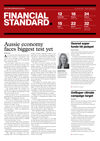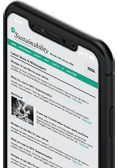Editor's Choice
Podcast: From silos to synergy
First Sentier Investors' global head of responsible investment Kate Turner joins The Greener Way to discuss how accounting for the many inter-reactions and flow-on effects of addressing specific sustainability issues can lead to improved outcomes.
Plenti wins WA government mandate
ASX-listed Plenti Group has won a mandate from the Western Australian government to help the state accelerate the adoption of batteries.
Carbon tariffs on some imports urgently needed: Climate Energy Finance
Despite the raging global trade war, Climate Energy Finance (CEF) is calling for carbon tariffs on some imports and for Australia to lead the way for a regional Asian carbon border adjustment mechanism (CBAM).
Climate investing declines amid Trump's anti-clean energy regime
Although investors are withdrawing from climate investing due to uncertainty from the aggressive approach by the US President Donald Trump in his pro-fossil fuels and anti-energy agenda, it opens up opportunities further afield.



















Imposing a levy on imports that maintains CO@ emissions at local levels MUST include the emissions generated from inbound freight. Then we will some non-sensical product imports.
I imagine it would then kill off the proposal to import potatoes from Canada, for example.
As an employee in the manufacturing sector, I sense that industry is concerned at the downstream cost increases for energy consumption from a tax imposed on producers for CO2 emissions. Our operations in NSW incurred a 30% hike in electricity costs last year.
if a $20 a tonne levy is ever passed through to businesses buying electricity, it will push the cost up another 20%. In marginalising domestic manufacturing, has anyone considered balancing this domestic impost with penalties on energy intensive competitor imports?
Could we not impose an even playing field where importers are required to maintain CO2 emissions at the local level, without going into the territory of protectionism?
I think a lot of the anger being displayed throughout the national electorate is because the impost of a tax implies ONLY that business and consumers will use less fuel & electricity when the cost jumps a further 25%. Where are the pro-active policies for renewables, imports and alternates to balance this community cost?
I understand that electricity userd in NSW will be hit with 42% rises in charges over the next few years due to current infrastructure plans, on top of last year's 30% rise. Now we forsee government layering another 25% based on carbon dioxide emissions.
So the power cost doubles over 3-4 years.
How many businesses in NSW will consequently disappear?
Where is the capacity in substitutes?
Why isn't Paul Howes making a big noise about this?